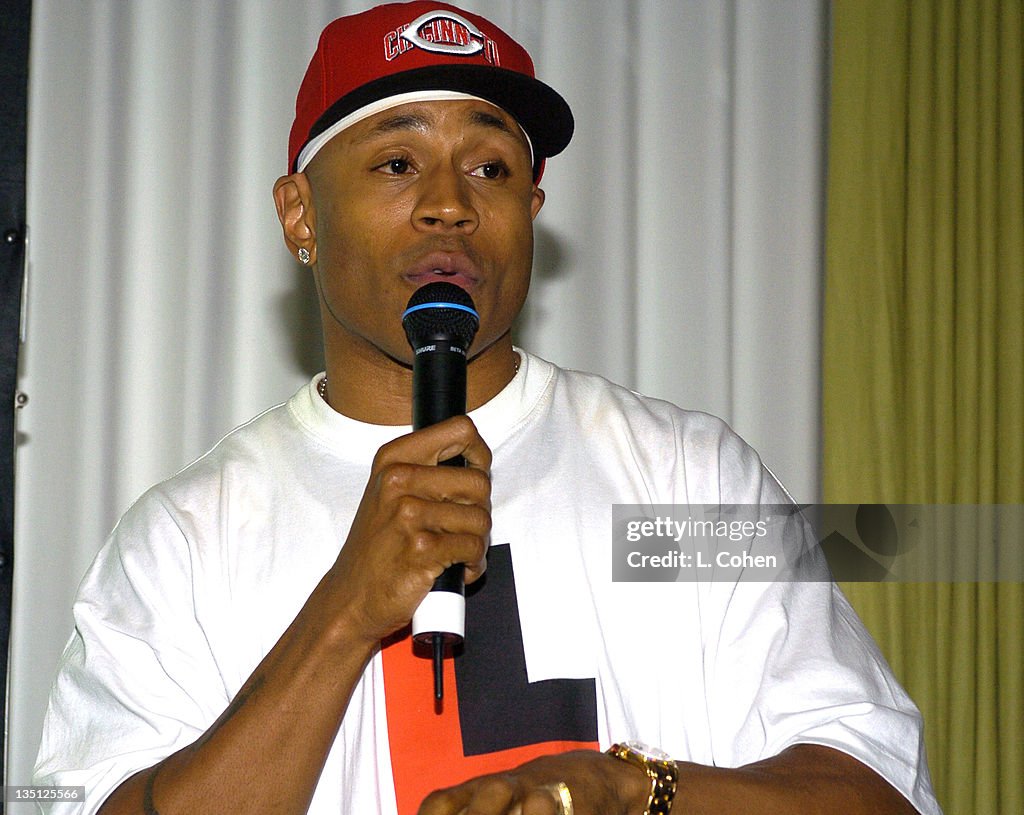LL Cool J, a legendary rapper and actor, has been a prominent figure in the entertainment industry for decades. Beyond his iconic music and acting career, he has also played a significant role in raising awareness about HIV and AIDS. Through his work, LL Cool J has not only entertained millions but also educated the public on critical health issues affecting society today.
As one of the pioneers of hip-hop culture, LL Cool J's influence extends far beyond music. His ability to connect with audiences across generations has allowed him to address important topics like HIV awareness effectively. By leveraging his platform, LL Cool J has contributed significantly to reducing stigma and promoting education about HIV/AIDS.
This article explores LL Cool J's journey in raising HIV awareness, highlighting his contributions, efforts, and the impact he has made in the fight against HIV/AIDS. We will delve into his biography, career highlights, and his advocacy work while providing valuable insights into the current state of HIV research and prevention.
Read also:Trueandco Com Bras Your Ultimate Guide To Comfort And Style
Table of Contents
- Biography
- Career Highlights
- LL Cool J's Role in HIV Awareness
- Reducing Stigma Around HIV
- Prevention Efforts
- Current Research on HIV
- Education Initiatives
- Community Impact
- Challenges in the Fight Against HIV
- Future Directions
Biography
LL Cool J, whose real name is James Todd Smith, was born on January 14, 1968, in Bay Shore, New York. He grew up in a musical family and developed a passion for music at an early age. LL Cool J began his career in the mid-1980s, quickly becoming one of the most influential figures in hip-hop history.
Below is a summary of his personal information:
| Full Name | James Todd Smith |
|---|---|
| Date of Birth | January 14, 1968 |
| Place of Birth | Bay Shore, New York, USA |
| Profession | Rapper, Actor, Author |
| Known For | His music career, acting roles, and HIV advocacy |
Early Life and Career
LL Cool J's early life was marked by a strong interest in music and performance. He began rapping at the age of 11 and released his debut album, "Radio," in 1985, which became a massive hit. His career skyrocketed from there, earning him numerous awards and accolades.
Career Highlights
LL Cool J's career spans multiple decades, during which he has achieved remarkable success in both music and acting. Some of his notable accomplishments include:
- Releasing several platinum-selling albums, such as "Bigger and Deffer" and "Mama Said Knock You Out."
- Winning a Grammy Award for Best Rap Solo Performance in 1991.
- Acting in popular TV shows and films, including "NCIS: Los Angeles" and "Deep Blue Sea."
Music and Acting Success
LL Cool J's versatility as an artist has allowed him to excel in both music and acting. His ability to adapt and evolve with changing trends has kept him relevant in the entertainment industry for over three decades.
LL Cool J's Role in HIV Awareness
LL Cool J's involvement in HIV awareness began in the early 2000s when he became an advocate for health education and prevention. Through partnerships with organizations like the Elizabeth Glaser Pediatric AIDS Foundation, he has worked tirelessly to promote awareness and reduce stigma surrounding HIV/AIDS.
Read also:Alexa Demie Makeup Looks A Comprehensive Guide To Her Stunning Beauty Styles
Partnerships and Advocacy
LL Cool J has collaborated with several organizations to promote HIV awareness. These partnerships have enabled him to reach a broader audience and educate people about the importance of testing and treatment.
Reducing Stigma Around HIV
One of the key challenges in the fight against HIV is reducing the stigma associated with the disease. LL Cool J has played a crucial role in addressing this issue by sharing personal stories and experiences. By doing so, he has helped to humanize the conversation around HIV and encouraged others to seek testing and treatment.
Sharing Personal Stories
LL Cool J has openly discussed his own experiences with HIV awareness, emphasizing the importance of education and understanding. His willingness to share these stories has inspired many to take action and get involved in the fight against HIV/AIDS.
Prevention Efforts
Prevention remains a critical component of the fight against HIV. LL Cool J has supported various initiatives aimed at reducing the spread of the virus, including promoting condom use and encouraging regular testing.
Promoting Safe Practices
LL Cool J has been a vocal advocate for safe practices in preventing HIV transmission. By educating the public about the importance of using protection and getting tested regularly, he has contributed to reducing the incidence of new HIV cases.
Current Research on HIV
Research into HIV continues to advance, with scientists working tirelessly to find a cure and improve treatment options. LL Cool J has stayed informed about these developments and uses his platform to share updates with his audience.
Advancements in Treatment
Recent advancements in HIV treatment have significantly improved the quality of life for those living with the virus. Antiretroviral therapy (ART) has become the standard of care, allowing individuals to live long, healthy lives while managing their condition.
Education Initiatives
Education plays a vital role in the fight against HIV. LL Cool J has supported various educational programs aimed at increasing awareness and understanding of the disease. These initiatives focus on teaching young people about safe practices and encouraging them to get tested regularly.
Targeting Youth
LL Cool J's educational efforts have primarily focused on reaching younger audiences, as they are at higher risk of contracting HIV. By targeting this demographic, he hopes to empower young people with the knowledge and tools they need to protect themselves.
Community Impact
LL Cool J's work in HIV awareness has had a significant impact on communities worldwide. By promoting education, reducing stigma, and supporting prevention efforts, he has helped to improve the lives of countless individuals affected by HIV/AIDS.
Empowering Communities
Through his advocacy and educational initiatives, LL Cool J has empowered communities to take control of their health and well-being. His efforts have inspired many to get involved in the fight against HIV/AIDS and work towards a brighter future for all.
Challenges in the Fight Against HIV
Despite significant progress in recent years, the fight against HIV still faces numerous challenges. These include overcoming stigma, ensuring access to treatment, and addressing disparities in care. LL Cool J continues to address these issues through his advocacy work.
Addressing Disparities
LL Cool J has highlighted the importance of addressing disparities in HIV care, particularly among marginalized communities. By advocating for equal access to treatment and resources, he has helped to level the playing field for those most affected by the disease.
Future Directions
Looking ahead, the fight against HIV will continue to evolve as new treatments and technologies emerge. LL Cool J remains committed to supporting these efforts and ensuring that his advocacy work continues to make a difference in the lives of those affected by HIV/AIDS.
Staying Informed and Engaged
As research and treatment options continue to advance, staying informed and engaged in the fight against HIV is more important than ever. LL Cool J encourages everyone to educate themselves about the disease and support efforts to eradicate it once and for all.
Conclusion
LL Cool J's contributions to HIV awareness have been invaluable in the fight against the disease. Through his advocacy work, partnerships, and educational initiatives, he has helped to reduce stigma, promote prevention, and improve the lives of countless individuals affected by HIV/AIDS.
We encourage readers to take action by educating themselves about HIV, supporting advocacy efforts, and sharing this article with others. Together, we can continue to make progress in the fight against HIV and work towards a future free from the disease.
For more information on HIV awareness and prevention, please refer to reputable sources such as the Centers for Disease Control and Prevention (CDC) and the World Health Organization (WHO).


